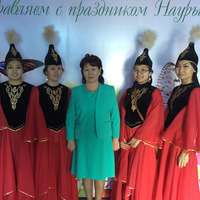Research Interests:
In the course of the work, an analysis of modern domestic and foreign paremiological studies was carried out, modern scientific trends and directions of these studies were identified. The end of the 20th century and the beginning of the... more
In the course of the work, an analysis of modern domestic and foreign paremiological studies was carried out, modern scientific trends and directions of these studies were identified. The end of the 20th century and the beginning of the 21st century was done a reproductive descriptive and analytical review of research on modern domestic and foreign paremiology. The study of proverbs in Kazakh linguistics is divided into four stages, in which the third stage develops in the areas of ethnolinguistics, comparative lingua-cultural studies, and gender linguistics. The anthropocentric study of proverbs separated them from phraseology, turned them into a separate branch of folklore science, and focused on the communicative and pragmatic potential of paremiological units. The article analyzes the main aspects of modern domestic and foreign paremiological research, clarifies the directions and prospects for the development of paremiology of the Kazakh language, focuses on the tasks of future...
Research Interests:
This edited volume is a feast of contemporary Kazakh proverb research. You are invited to the low table, the Kazakh dastarkhan, where special dishes cover the table. Everything is within easy reach, and each of the delicacies is homemade,... more
This edited volume is a feast of contemporary Kazakh proverb research. You are invited to the low table, the Kazakh dastarkhan, where special dishes cover the table. Everything is within easy reach, and each of the delicacies is homemade, with a distinctive Kazakh flavor. Whether you are a linguist, folklorist, anthropologist, or just someone wanting to know more, this feast has something to offer. Come join us for a cup of tea, some respite, and the opportunity to enter into the world of Kazakh proverb research! There are five courses: current use of Kazakh proverbs at home, in school, and on the internet; the content of proverbs used historically and in fiction; the dynamic relationship between proverbs and culture in Kazakhstan; the role of proverbs in education (both the ecologies of proverbial interaction between languages and the opportunities provided by technology); and finally, new vistas for the future of Kazakh proverb use. With the expanded role of the internet, Kazakhs ...
Research Interests:
Research Interests:
Abstract. In this article, phraseological modernisms in politics created by using conceptual metaphors are the subject of the research. The article studies the method of cognitive derivation of political phraseological modernisms. The... more
Abstract. In this article, phraseological modernisms in politics created by using conceptual metaphors are the subject of the research. The article studies the method of cognitive derivation of political phraseological modernisms. The objective of this article is to reveal the methods of cognitive derivation of phraseological modernisms and to describe the models of the conceptual metaphor, using which new words are built. The article uses comprehensive methodological paradigm that also includes the cross-disciplinary, anthropocentric, and cognitive principles. The methods applied in this work are: modeling, conceptual analysis, the model of conceptual metaphor in its function as a method of cognitive derivation. The following results were obtained in the process of the research: the models of conceptual metaphor used as the main method of cognitive derivation were revealed and described; it was stated that phraseological modernisms can be created by means of both secondary naming a...
Research Interests:
Research Interests:
Recently Content and Language Integrated Learning (CLIL) has become well established in the educational system of Kazakhstan. CLIL means teaching a subject, in our case economics and business, through the second language, the Kazakh... more
Recently Content and Language Integrated Learning (CLIL) has become well established in the educational system of Kazakhstan. CLIL means teaching a subject, in our case economics and business, through the second language, the Kazakh language at Nazarbayev University. The paper examines the effectiveness of this approach, and provides guidelines for the successful implementation of CLIL. One of the main advantages of this approach is content-driven; the dual focus of teaching both the subject and the language together will increase students’ motivation to learn the target language. Learning the language becomes more focused, as the language is used to solve specific communicative tasks. Thus, the ability to communicate in the Kazakh language in a professional context becomes, after all, a priority. This article explores the language of economics and business based on the subject and language materials in the Kazakh language. The author provides suggestions for designing economics- an...
Research Interests:
In this article, phraseological modernisms in politics created by using conceptual metaphors are the subject of the research. The article studies the method of cognitive derivation of political phraseological modernisms. The objective of... more
In this article, phraseological modernisms in politics created by using conceptual metaphors are the subject of the research. The article studies the method of cognitive derivation of political phraseological modernisms. The objective of this article is to reveal the methods of cognitive derivation of phraseological modernisms and to describe the models of the conceptual metaphor, using which new words are built. The article uses comprehensive methodological paradigm that also includes the cross-disciplinary, anthropocentric, and cognitive principles. The methods applied in this work are: modeling, conceptual analysis, the model of conceptual metaphor in its function as a method of cognitive derivation. The following results were obtained in the process of the research: the models of conceptual metaphor used as the main method of cognitive derivation were revealed and described; it was stated that phraseological modernisms can be created by means of both secondary naming and cogniti...
